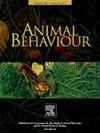The influence of social rank on learning in a group-living fish
IF 2.3
2区 生物学
Q2 BEHAVIORAL SCIENCES
引用次数: 0
Abstract
Dominance hierarchies are found in many group-living species, and an individual’s social rank can influence their access to resources, behaviours and physiology. However, the effect of rank on learning capability has not been well studied. Here, we examined how rank influences learning in the group-living cichlid fish Neolamprologus pulcher. We tested learning in both dominant and subordinate fish and investigated whether rank is related to the capacity to learn independently as well as from others. Fish learned to move coloured discs to access a food reward, either by trial and error on their own, or by watching a trained demonstrator. We found no differences between ranks in the individual associative learning task, but subordinates were faster at changing their behaviour when we changed the reward rules (during the reversal learning phase). We also found no differences in the number of trials it took dominants and subordinates to socially learn the task (from watching demonstrators), but individuals learned the task faster when they could observe others. Our results indicate that some aspects of cognition can be influenced by social rank, but rank does not appear to affect general learning ability.
社会等级对群居鱼学习的影响
在许多群居物种中都发现了统治等级,个体的社会等级可以影响他们对资源、行为和生理的获取。然而,等级对学习能力的影响还没有得到很好的研究。在这里,我们研究了等级如何影响群居慈鲷的学习。我们测试了主导鱼和从属鱼的学习能力,并调查了等级是否与独立学习能力和向他人学习能力有关。鱼学会了移动彩色的圆盘来获得食物奖励,要么是通过自己的试错,要么是通过观看训练有素的示范者。我们发现,在个体联想学习任务中,不同级别之间没有差异,但当我们改变奖励规则时(在逆向学习阶段),下属改变行为的速度更快。我们还发现,主导者和下属在社会性学习任务(通过观察示威者)时所进行的试验次数没有差异,但当个体能够观察他人时,他们学习任务的速度会更快。我们的研究结果表明,认知的某些方面可能受到社会地位的影响,但社会地位似乎不影响一般的学习能力。
本文章由计算机程序翻译,如有差异,请以英文原文为准。
求助全文
约1分钟内获得全文
求助全文
来源期刊

Animal Behaviour
生物-动物学
CiteScore
4.60
自引率
8.00%
发文量
236
审稿时长
10.2 weeks
期刊介绍:
Growing interest in behavioural biology and the international reputation of Animal Behaviour prompted an expansion to monthly publication in 1989. Animal Behaviour continues to be the journal of choice for biologists, ethologists, psychologists, physiologists, and veterinarians with an interest in the subject.
 求助内容:
求助内容: 应助结果提醒方式:
应助结果提醒方式:


